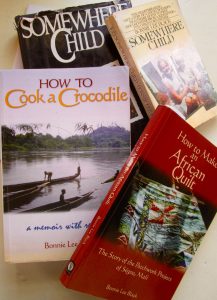My mom, Lee Black, was not much of a reader.
Yes, she read our town’s weekly newspaper avidly, hungry to learn all that was considered news in the little spot in northern New Jersey she considered the center of the universe. She read that paper with her reading glasses on, a pair of kitchen scissors in her right hand, and a stack of small white envelopes and roll of postage stamps nearby, ready to clip and mail articles of interest that she was sure some of her friends might have missed. She was a one-woman volunteer clipping service.
But books? Not so much. Book-reading, she believed, was for lazy people. Like the big guy stretched out on our living room sofa, deeply absorbed in his latest Louis L’Amour frontier novel, waiting for supper to be served. This guy, whom she quietly referred to, as I helped her prepare supper in the kitchen, by the initials “G.D.S.O.B,” was my book-loving father. Not good at keeping a job or helping around the house, he was excellent at finishing books. The more, the better. Books and booze were his great escapes.
I have a dear friend who once told me that when she was young her mom used to chase the kids – all six of them – out of the house after lunch so she (her mom) could make herself a mug of coffee, put her feet up, smoke a cigarette, and read a book. This was her bliss, and the kids learned to respect it. They stayed outside and played.
I was shocked when I heard this story, not by the cigarette (moms used to smoke in those days), but by the book in her mom’s hand. I don’t remember ever seeing my mom hold a book when I was a kid, not even to read me or my siblings bedtime stories. To her, books were somehow, strangely, verboten. Other than the likes of Louis L’Amour’s, there were no books in our house.
So, in time, after I learned to read, I had to sneak books into my life: creep off to the local library the back way on foot, check out the books that most tantalized me, spirit them into the house, tuck them under my pillow, then read them under the covers with the aid of a flashlight when everyone else, I thought, was asleep.
Sometimes she caught me. “You’re going to ruin your eyes!” Lee scolded me, somewhat presciently. But what I think she most feared was that I’d become “lazy” like my father; and to her, the hardest working woman I knew, daughter of hard-working German immigrants, “lazy” was a curse word.
“Don’t do this again!” she said to me, wagging her forefinger. But of course I did. I couldn’t help it; I’d inherited the book-loving gene from my Scottish father.
Many years later, when the big guy who used to stretch out with a book on the living room sofa was long gone, and all four of her kids were grown and scattered, and she had more time for herself after she came home from a grueling day at work, I urged Lee to read books – for enjoyment and self-enrichment. By this time, I’d gotten a degree in Literature and Writing from Columbia University, and I’d become a professional writer. I was passionately in love with the written word, especially those enshrined between the protective covers of books.
“Here’s one I think you’ll love, Mommy,” I said to her on a weekend visit. “It’s a classic. It’s also sexy.”
“Oh?” Her interest was piqued. She picked the book up and turned it in both hands. “Lady Chatterley’s Lover. Hmmm. What’s it about?”
“You’ll just have to read it and find out for yourself,” I said.
The next time I visited her, she gave me an over-the-top book report: “I loved it! It was like watching a good movie in my head! I could see everything! I felt like I was right there! I understood every word! It’s the best book I’ve ever read! I’m going to recommend it to all of my friends. D. H. Lawrence is a genius! Is he still alive? Has he written any other books? I want to read them all…”
Much later, after she was gone, and I’d embarked on a new, part-time career (to support my book-writing habit) teaching English and Creative Nonfiction Writing at the college level, I used to suggest to my students that they write for a person with the initials “Y.R.” (for Your Reader). “Think of one person who embodies everyone you’d like to be writing for,” I’d say. “Sit that person across from you – face to face, on the same level – at a pleasant, outdoor, bistro table. Write the way you would speak to that person, as a friend, sharing your thoughts. This will help you establish a consistent, genuine, tone and voice.”
For me, for years, that person, my own “Y.R.,” has been my mother, Lee. Having her sitting across from me, metaphorically, has reminded me to keep my writing real and down-to-earth (like Lawrence’s?), not to use stuffy, puffed-up language, not to waste her time. Books, qua books, to her might have been intimidating; but she, like everybody else, always loved a good story.
I used to write mainly for my mother, but now not as much. Now I seem to write for my grandchildren, who are grown and forging lives and careers of their own far away. In my mind they’re sitting across from me at that outdoor bistro table and I’m sharing with them my thoughts and memories, in the hope that they will be able to find the time in their demanding schedules to read what I’ve written for them.

